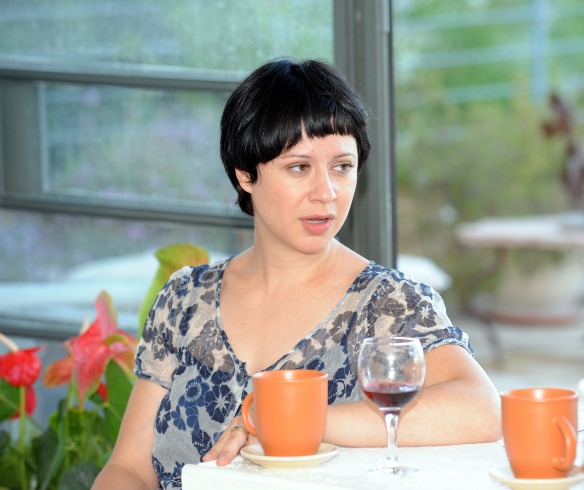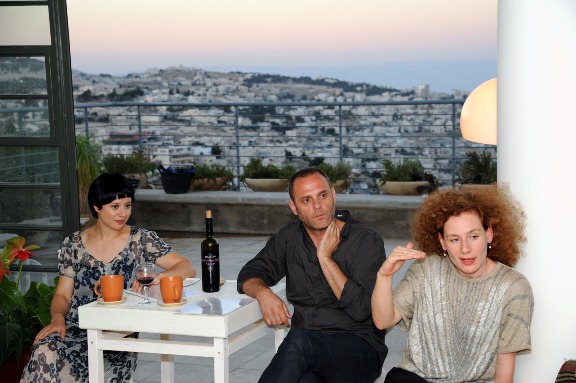
The fabric of our lives is woven of the sights, sounds, and scents of the cities we live in; the story of our lives is threaded with history, binding people together in a pattern of shared memories. We remember the city of our first love as well as our first love; we remember the landscape where we walked and talked, even when we no longer remember the words.
The Day Martin Buber Was Buried, a radio play by Israeli poet Yehuda Amichai (1924 – 2000), is a couple’s attempt to revisit the landscape and history of their relationship, to remember and understand. A theatrical adaptation created by the poet’s daughter, Emanuella Amichai, was performed by actors Micha Selekter and Ola Shor Selekter (partners in life as well as onstage) in a private home as part of the Jerusalem Season of Culture’s In-House Festival from July 3 – 5, 2012.
Venue is an integral part of any performance, from the moment one first sees the building. Walking up the marble stairs of a palatial opera house or down the uneven concrete stairs to a basement club – one enters each space differently, with different assumptions and expectations. As certain performances tend to take place in the same kind of venues, one tends to integrate these thoughts and feelings, becoming unaware of their influence. A site-specific performance that takes place in an unusual venue, or one that is not typically associated with the kind of performance that is presented there, jolts the viewer into a new awareness of place and its impact. A play performed in a private home, not the home of a friend or family member, but the home of a stranger willing to host such an event – opening up the privacy of her home to a random group of people connected by a common interest in theatre – creates a theatrical event that takes all participants out of the comfort zone, juxtaposing the familiar with the unexpected.
Entering someone’s home establishes a sense of intimacy, when the director is the writer’s daughter, and the subject matter is the break-up of a relationship, performed by actors who are also a couple, the borders between fiction and reality performer and audience begin to waver and blur; and it all takes place facing a wide balcony opening onto the Jerusalem landscape, under a full moon.
The evening opened with the director, Emanuella Amichai, reading from one of her father’s poems:
Jerusalem, a place everyone remembers / they have forgotten something but they do not remember what they have forgotten. / And in order to remember I / wear on my face my father’s face. / This is my city where the vessels of my dreams / are filled like oxygen tanks for deep-sea divers. / The holiness there / sometimes turns into love.
Amichai and his poetry are part of this Jerusalem landscape, and the city has a strong presence in his poetry. In this play, Jerusalem plays a central role, as the two lovers recall, or try to recall the moment they fell in love, and the moment that love fell apart. Poetry marks the place of everything that everyday life finds difficult to accommodate: uncertainty, ambiguity, contradictory thoughts and feelings. The play of memory and uncertainty is created through the dialogue of the couple with the soundtrack of Jerusalem.

The music and musical adaptation for the performance was created by Avi Benyamin, who performed alongside the actors. The different voices of Jerusalem were recorded by the actors, and merged with sounds and music to create a palimpsest of experiences. Sound and meaning acquire a different relationship in poetry; sound evokes and transforms the literal meaning of words. Employing the human voice as sound, the voices of the couple and the recorded sounds and voices play out like a musical score. “When did it begin?” they ask, each in turn, over and over again. The same question repeated acquires new meaning, reverberations of uncertainty echoing in the words.
With the audience just a few feet away from the actors, almost close enough to touch, the experience is intimate and personal. It’s almost like sitting in a small café, where one cannot help but hear the conversation at the next table, one cannot help but feel implicated, involved. Ola and Micha are both gifted with a capacity for great versatility and depth. Here they reveal aspects of their performing abilities that cannot be expressed in a large theatre, taking the audience on a delicately nuanced journey in which the slightest gesture conveys volumes of emotion, a whisper, an intake of breath can change the course of history.
One of the great gifts of this unusual venue is the balcony. Open to Jerusalem, an ever-changing stage set that invites the unexpected into the room, each performance is seen in a different light, each performance has a different sound and feel. On the night I saw the play, there was a full moon, and a wedding took place on a distant hill. As the couple before me traced the tender wounds of a love nearing its end, fireworks and song celebrated the beginning of new love and life.





